The LG G4 Review
by Joshua Ho on July 30, 2015 10:00 AM EST- Posted in
- Smartphones
- Qualcomm
- LG
- Mobile
- Snapdragon 808
- LG G4
Snapdragon 808
In configuring the G4, LG (and recently Motorola) have broken away from the pack in terms of SoC choice, electing to use Qualcomm’s Snapdragon 808. This makes the G4 the first flagship phone to launch with the 808 as its SoC, and the first phone overall that we have reviewed with the 808 as well.
For those that are unfamiliar with this SoC, I would refer to our previous coverage on the Snapdragon 808. In short, the Snapdragon 808 is effectively a simpler SoC than the Snapdragon 810, with two CPU cores on the big cluster instead of four, a more mature LPDDR3 memory controller, a smaller GPU, and some general reduction in features and complexity in some aspects like the ISP and video encode blocks.
| Qualcomm's Snapdragon 810 and 808 | ||||
| Snapdragon 810 | Snapdragon 808 | |||
| Internal Model Number | MSM8994 | MSM8992 | ||
| Manufacturing Process | 20nm | 20nm | ||
| CPU | 4 x ARM Cortex A57 + 4 x ARM Cortex A53 (big.LITTLE) | 2 x ARM Cortex A57 + 4 x ARM Cortex A53 (big.LITTLE) | ||
| ISA | 32/64-bit ARMv8-A | 32/64-bit ARMv8-A | ||
| GPU | Adreno 430 | Adreno 418 | ||
| H.265 Decode | Yes | Yes | ||
| H.265 Encode | Yes | No | ||
| Memory Interface | 2 x 32-bit LPDDR4-1600 | 2 x 32-bit LPDDR3-933 | ||
| Integrated Modem | 9x35 core, LTE Category 6/9, DC-HSPA+, DS-DA | 9x35 core, LTE Category 6/9, DC-HSPA+, DS-DA | ||
| Integrated WiFi | - | - | ||
| eMMC Interface | 5.0 | 5.0 | ||
| Camera ISP | 14-bit dual-ISP | 12-bit dual-ISP | ||
| Shipping in Devices | 1H 2015 | 1H 2015 | ||
Meanwhile to understand why four cores is not immediately better than two cores - and thus why Snapdragon 808 is not as big of a difference from Snapdragon 810 as it may first seem - it's important to understand Amdahl's law, which is pretty simple once you think about it. In short, for a given workload if a certain percentage is inherently single-threaded, no matter how many cores you throw at the problem you will eventually rearch a point where you are solely limited by how fast the single-threaded portion (critical section) of the code will run, and the returns diminish with each core you throw at the problem. It turns out that people in general are really bad at thinking in a parallel manner anyways, so writing code that actually takes advantage of multiple cores is generally difficult and as a result a lot of applications will leave much of the work on a single thread anyways, so the third and fourth cores of a CPU can go relatively unused in some situations.
In the specific case of the Snapdragon 808 and Snapdragon 810, the differences between the SoCs' CPU blocks are definitely bigger than just a case of lopping off cores from a die. As a result the actual power consumed for a single core at a given frequency isn't guaranteed to be the same. There's definitely overhead involved in wiring up additional cores, so product design has to balance core count with core complexity.
System Performance
When it comes to smartphones, there’s a sort of hierarchy of needs when it comes to establishing a great user experience. If you follow this down to the base, the foundation that everything rests upon is the hardware. Within the somewhat nebulous area of hardware, there are a number of key drivers for app performance in the hardware. These areas include the SoC and eMMC/NAND. DRAM is also a key factor, but this is often hard to perceive as so much of a modern PC is designed specifically to hide the relatively high latency and low bandwidth of DRAM.
In order to try and get a holistic view of a smartphone, we run a suite of benchmarks ranging from Javascript/HTML5 browser tests to system API performance benchmarks like PCMark to attempt to get a good feel for whether a smartphone will perform well, in conjunction with subjective performance observations from day to day use.
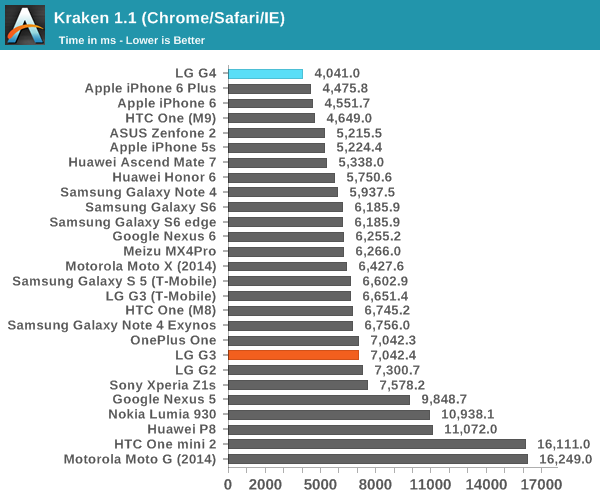
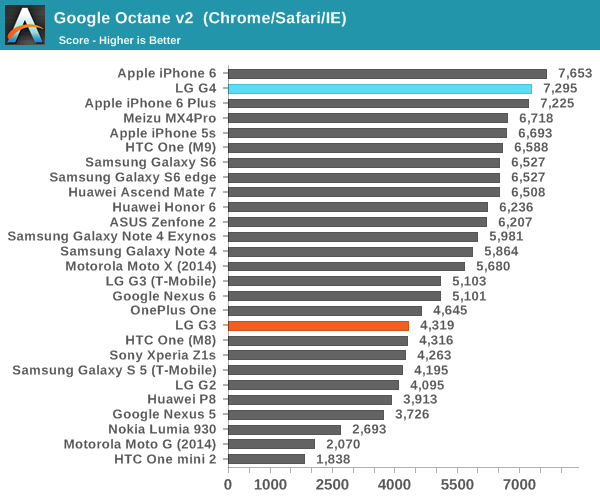
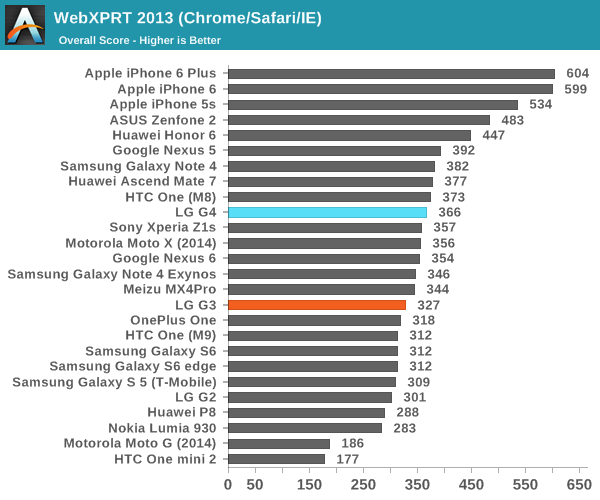
As we can see here, it looks like the combination of the Snapdragon 808 SoC and some work on LG/Qualcomm's part with optimizations for Chrome produces some pretty stunning results in Kraken and Octane. I suspect at least part of this is better optimization at the SoC level for the Cortex A57 in the Snapdragon 808/general software optimization, and at least partly optimizations designed to improve scores in those benchmarks as performance is noticeably more mixed in WebXPRT 2013. At any rate, web browsing performance is consistently good with the G4 and even intensive sites scroll smoothly.
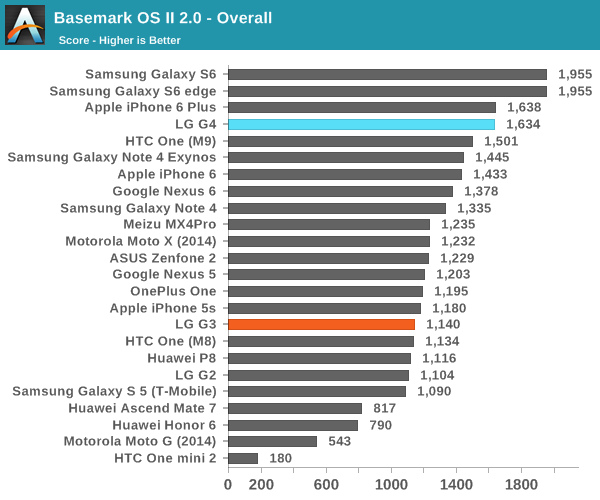
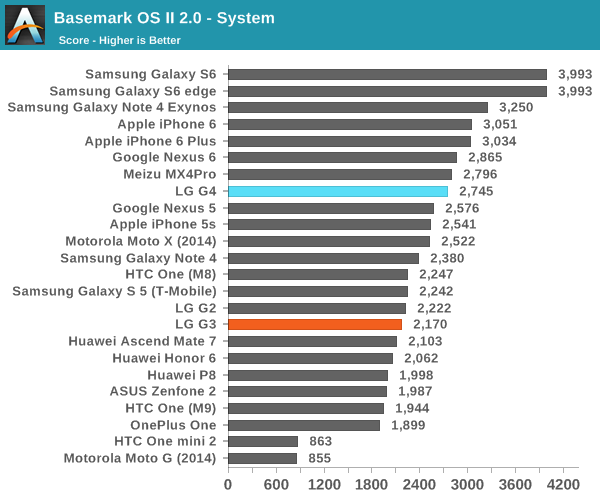
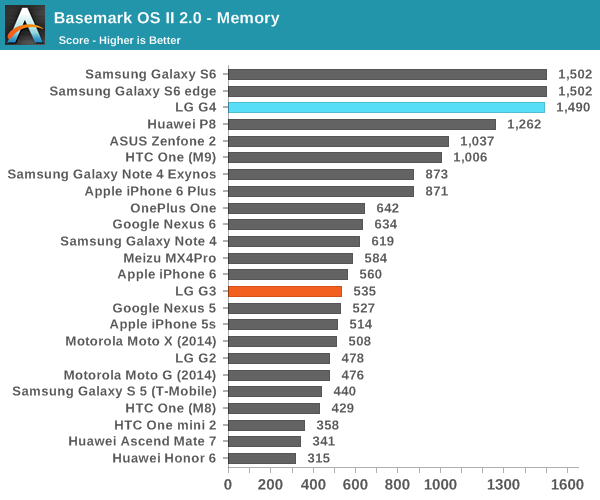
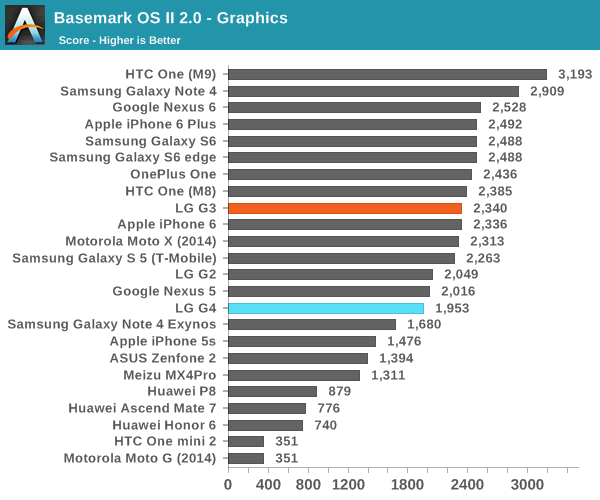
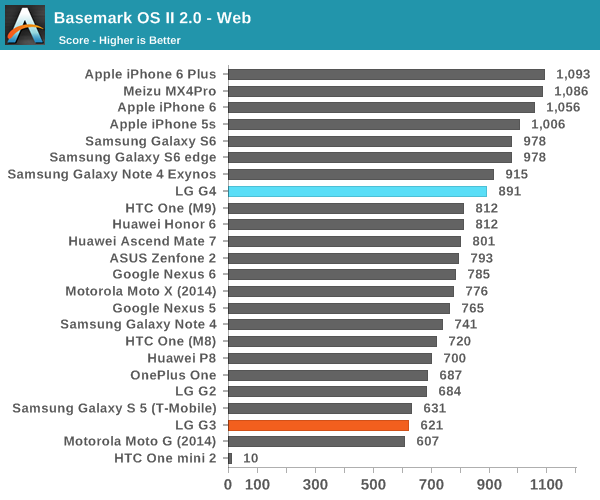
Once again, we see a noticeable performance uplift relative to the Snapdragon 810 devices that we've tested. It seems that LG has made a solid judgment call when they decided to use Snapdragon 808 instead of 810. However, despite this we see that the LG G4 trails behind the Galaxy S6 in terms of performance, which is due to the lower GPU score here which is closer to the Snapdragon 800 than Snapdragon 805.
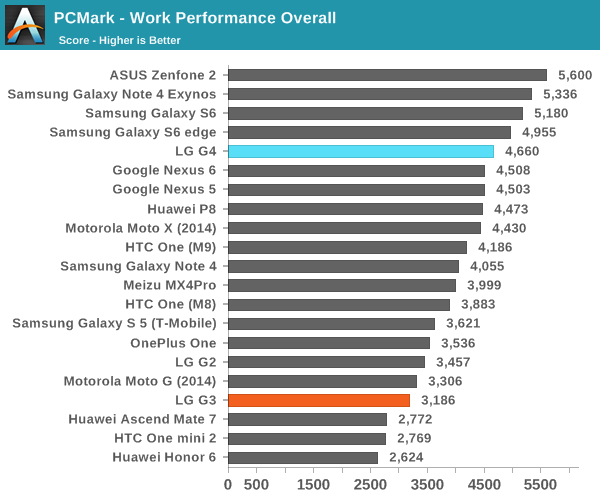
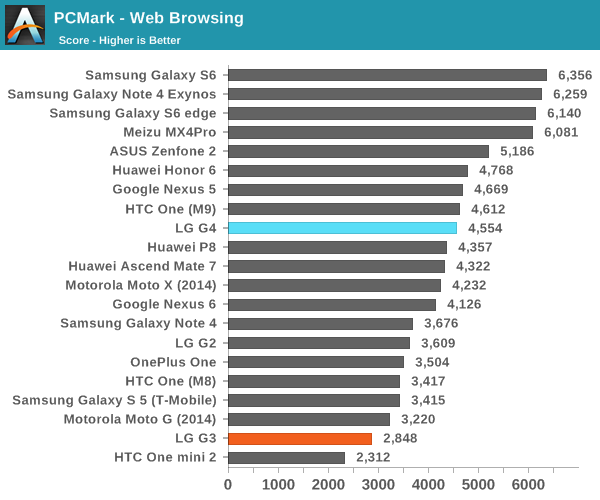
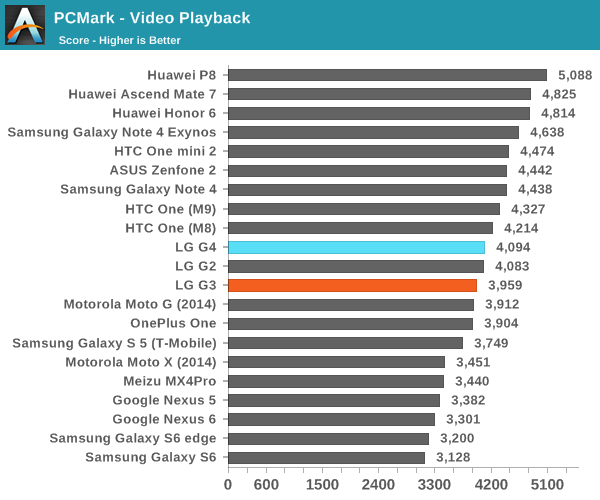
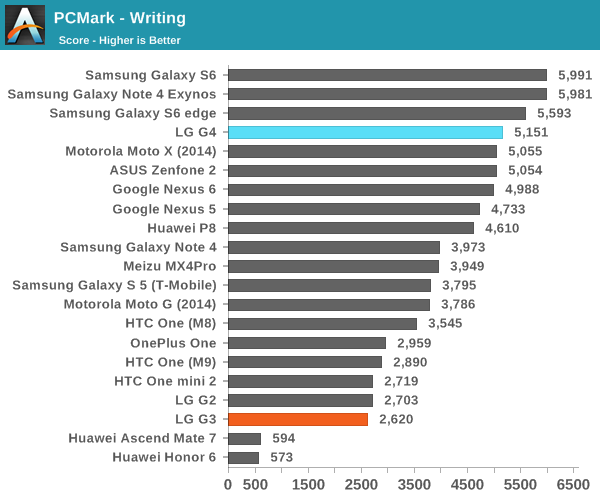
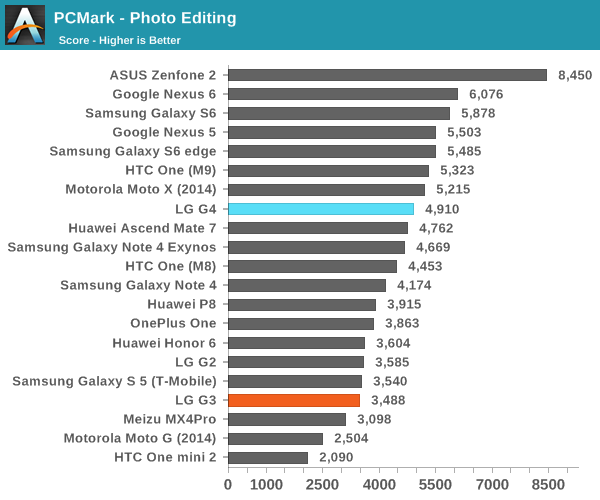
Once again, we see that the G4 performs quite strongly in these general purpose benchmarks, which to some extent affirms that more cores aren't necessarily better, as core count alone really fails to describe significant differences between SoCs. With a combination of the Snapdragon 808 SoC and better software optimization, it seems that LG has made a phone that can perform everyday tasks better than Snapdragon 810 devices, although it still falls short when compared to something like the Galaxy S6.










84 Comments
View All Comments
Impulses - Friday, July 31, 2015 - link
I get that Anandtech is US centric to an extent, but with a lot of people in the US opting for contract-less plans to save money it might make sense to start factoring price into the equation when it comes to flagships... I wouldn't even have a clue if there are any significant differences, last phone I bought was the N5 and that was the first and only phone I've paid for in full w/o subsidy.tuxRoller - Thursday, July 30, 2015 - link
Such a shame Qualcomm didn't make the 808's cores faster (say, 2GHz) and equip it with at least the adreno 420.I understand why they didn't, and given the 810's design wins, their strategy clearly worked, but it still leads me to wonder "what if".
I wonder what's going on with their implementation of cci(assuming that's the culprit)? They've had enough experience by now to know how to properly implement a standard two tier cache system.
Buk Lau - Thursday, July 30, 2015 - link
if they boosted the 808 to higher clocks, which I'm sure they could since all they've been doing since 801 is just overclocking the chips, that would give OEMs more incentives to choose the 808 over the 810. let's say this, if the 808 comes higher clocked A57s and adreno 420, how many people do you think would even consider the 810? After all the 810 is much more profitable than 808. It just sucks to see how many OEMs got burnt by 810.in a sense, OEMs only have themselves to blame rather than qualcomm for having to release junk phones all over this year. back in the old days qualcomm's SoCs suffered even worse overheating and performance and yet OEMs still persist to use their stuff, simply because they offered an integrated modem
if they didn't spoil qualcomm so much back then, there wouldn't be so little choices in the SoC market with players like Texas instruments and others competing against qualcomm.
Impulses - Friday, July 31, 2015 - link
Don't NVidia and Intel have integrated modems at this point? They're still making SoCs, as is Samsung, seems there's still plenty of choices... We lost what, TI and Sony? I must be forgetting others, I remember lamenting the contracting SoC market too...whiteiphoneproblems - Thursday, July 30, 2015 - link
"It seems that these improvements have been enabled with the use of photoalignment technology, which shares similarities with photolithography but attempts to induce anisotropy in a photoresist analogue on a glass substrate..."Well, you won't see a sentence like that in Gizmodo.com...!
zodiacfml - Friday, July 31, 2015 - link
Another excellent review. Thanks. I also love it when you include many other phones such as the Nexus 5 and Moto G in the benchmarks.Good thing the dual core has real life advantages over the 810. The 8 core spec is nothing but marketing advantage.
As a camera enthusiast, I would also love the manual controls. Yet, I don't think I would use it too often as the control you could get doesn't add to much to the image quality. I mean, using HDR mode pretty much fixes the IQ weaknesses of smartphone cameras to dedicated, larger cameras. The worse noise in the corners probably indicates vignetting with the lenses, only it is fixed/lifted in processing.
Few months after release, the G4 is now slightly cheaper compared to S6 yet I don't think it is enough. The S6 still has a lot better value to G4 because of the display and SoC. The external build quality and video specs makes the S6 even higher. The only fault of the S6 is the small battery they included with it. The Note 5 surely will fix that but it's going to be much more expensive.
Mugur - Friday, July 31, 2015 - link
Nice review, although some phrases were a bit too strange for my taste..."One of the major points of emphasis for us in the smartphone space continues to be display, as even though you can replace a display on a phone, the only real reason to do so is if you shatter the glass cover of the display."
And, of course, I fully disagree with the claim that "the GS6 is roughly equal to or slightly worse than the iPhone 6 Plus as a camera overall". In my personal experience, the S6 camera is the best all-around camera, at least with auto settings and I'm not a Samsung fan...
victorson - Friday, July 31, 2015 - link
Hey Josh! You're fired.neo_1221 - Friday, July 31, 2015 - link
I got a laugh out of that too. :Dmpokwsths - Friday, July 31, 2015 - link
These ridiculous nand/storage benchmarks...